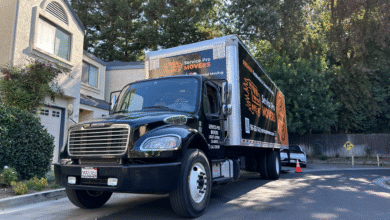Your Complete Guide to Hiring Moving Companies: A First-Timer’s Roadmap

Hiring your first moving company can feel like navigating uncharted territory. You’re trusting strangers with everything you own, often spending thousands of dollars in the process. The stakes feel incredibly high because they are. One wrong choice could mean damaged belongings, hidden fees, or a completely ruined moving experience.
The moving industry unfortunately attracts both exceptional professionals and unscrupulous operators. Learning to tell the difference protects your belongings and your sanity.
This guide walks you through every decision point, from your first phone call to the final signature on delivery day.
Recognizing When Professional Help Makes Sense
Moving yourself seems like the obvious way to save money, but it’s not always the smartest financial decision. When you factor in truck rental, gas, packing supplies, potential injury costs, and time off work, professional movers often cost less than you’d expect. The real question becomes whether the convenience and peace of mind justify any additional expense.
Distance plays a huge role in this calculation.
Local moves within the same city might make sense to handle yourself, especially if you have friends willing to help. Once you’re moving beyond your local area, the complexity increases dramatically. Interstate moves involve regulations, timing coordination, and logistics that professionals handle much more efficiently.
Your belongings also influence this decision.
Standard furniture and boxes are one thing, but items like pianos, artwork, antiques, or fragile collections require specialized knowledge. Professional movers carry equipment and insurance specifically designed for these challenges. The cost of replacing one damaged valuable item often exceeds the entire moving bill.
Physical limitations matter more than most people admit upfront. Moving heavy furniture safely requires proper technique, equipment, and often multiple people working in coordination. Back injuries from moving attempts are incredibly common and can affect your quality of life for months or years.
Understanding Your Service Options
The moving industry offers several service levels, each designed for different needs and budgets.
Full Service Movers
Full-service moving represents the premium experience where professionals handle every aspect of your relocation. They arrive with boxes and packing materials, carefully wrap and pack everything in your home, load it onto their truck, transport it to your destination, and unpack it in your new space. Some companies even arrange furniture and hang pictures if requested.
Partial Movers
Partial service strikes a middle ground that appeals to many households. You handle the packing yourself, which gives you control over how your belongings are wrapped and organized. Professional movers then take over for the heavy lifting, loading your packed boxes and furniture onto their truck, transporting everything, and unloading at your destination. This approach saves money while still protecting you from the most physically demanding aspects of moving.
Hiring an Independent Contractor as Helping Hand
Labor-only services provide just the workforce when you need it most. You rent your own moving truck and handle the planning, but hire professionals for the actual loading and unloading. This works particularly well for local moves where you can make multiple trips if needed. The hourly rates are typically lower than full-service options, though you take on more responsibility for coordination and timing.
Some situations call for specialized services beyond basic moving. Piano movers have the equipment and expertise to handle these delicate, expensive instruments safely. Art handlers understand how to pack and transport paintings, sculptures, and other valuable pieces. If you’re dealing with a wine collection, antique furniture, or other specialized items, seek out companies with specific experience in those areas.
The Cost Estimate Process
The estimate process reveals a lot about a moving company’s professionalism and reliability. Legitimate companies want to see exactly what they’re moving before providing a price quote. This might happen through an in-home visit where an estimator walks through your house, or increasingly through virtual consultations conducted over video calls.
Initial Assessment
During this assessment, experienced estimators do more than just count boxes. They note potential challenges like narrow staircases, heavy furniture pieces, or difficult parking situations at either location. They ask about items that need special handling and identify anything that might require additional labor or equipment. All of these factors influence both the cost and the logistics of your move.
Documentation
The estimate itself should arrive as a detailed written document that breaks down all anticipated costs. This includes the base moving fee, but also any additional charges for services like packing, storage, or handling oversized items. Reputable companies explain their pricing structure clearly and identify any circumstances that might lead to additional charges.
Binding estimates guarantee that your final bill won’t exceed the quoted amount, regardless of how long the move actually takes or what challenges arise. This provides valuable predictability for your budget planning. Non-binding estimates can increase by up to 10 percent based on actual weight or additional services needed on moving day. Understanding which type you’re receiving prevents unpleasant financial surprises later.
Getting multiple estimates serves two important purposes.
First, it gives you a realistic understanding of what your move should cost. If one quote is dramatically higher or lower than the others, you can ask specific questions about what accounts for the difference. Second, the estimate process itself tells you a lot about each company’s professionalism, communication style, and attention to detail.
Spotting Problems Before They Start
Watch Out for Door-to-Door Solicitation
Legitimate moving companies build their businesses through referrals, online presence, and established relationships. They don’t need to knock on doors. If someone shows up using high-pressure sales tactics or pushing you to book immediately, consider it a red flag.
Payment Demands That Don’t Add Up
Reputable movers usually require only a small deposit, with the balance due after services are complete. Be cautious of companies demanding large upfront payments, cash-only transactions, or money long before moving day, these are common signs of scams.
Licensing Issues to Avoid
A moving company should provide current licensing numbers that match their registration. Expired credentials, mismatched names, or refusal to share licensing details are clear warning signs. A quick online check can protect you from serious problems later.
Too-Good-to-Be-True Estimates
If one company’s quote is drastically lower than others, ask detailed questions. Some operators use lowball pricing to win your business, only to tack on huge hidden fees once your belongings are on the truck, when you have little leverage.
Preparing for a Successful Moving Day
Confirm Details in Advance
Call your mover 24–48 hours before moving day to confirm crew size, arrival time, and any special instructions.
Get Your Home Ready
Clear walkways for movers, and discuss floor or wall protection needs ahead of time.
Plan Parking Ahead of Time
Ensure space for the moving truck at both locations. In apartments or cities, you may need permits or reserved spaces.
Pack an Essentials Kit
Keep items like medications, chargers, toiletries, snacks, and documents with you—not on the truck.
Understanding Contracts and Protection
Read Contracts Carefully
Review pickup/delivery windows, payment terms, and liability coverage. Never rush signing.
Know Your Insurance Options
Basic liability coverage offers minimal protection. Full replacement value coverage costs more but ensures damaged items are repaired, replaced, or compensated fairly.
Choosing Between Local and Long-Distance Specialists
Local Moves
For short-distance relocations, local movers usually charge by the hour, making them a cost-effective choice for nearby transitions. Moving companies in North Carolina often provide added value with their knowledge of local neighborhoods, traffic patterns, and regulations. This local expertise not only saves time but also ensures a smoother, more personalized moving experience.
Long-Distance Moves
Interstate moves require federal licensing and often price jobs by weight and distance. They also demand more complex logistics and advance scheduling. You can also check this Forbes article about how much it cost to move across the country.
Making Moving Day Work Smoothly
- Be present during loading to review inventory lists and note pre-existing damage.
- Communicate clearly with the crew leader if issues arise.
- Keep valuables (jewelry, documents, cash, heirlooms) with you.
- Do a final walkthrough to ensure nothing is left behind.
After Moving day
- Inspect belongings immediately upon unloading. Photograph any damage.
- File claims quickly with full documentation.
- Leave honest reviews to help future customers.
- Keep all paperwork for at least a year for insurance, taxes, or warranties.
Making the Right Choice for Your Situation
Selecting the right moving company ultimately comes down to matching their capabilities with your specific needs and priorities. Consider not just the immediate cost, but the total value including your time, stress level, and risk tolerance. The cheapest option rarely provides the best overall value when you factor in these hidden costs.
Trust your instincts throughout the selection process. If something feels wrong about a company’s communication style, pricing approach, or general professionalism, keep looking. The moving industry includes many excellent companies that will treat your belongings with appropriate care and respect.
Remember that hiring movers is an investment in your future happiness and peace of mind. A smooth, professional moving experience from All Ways Moving sets a positive foundation for enjoying your new home from the very first day.




